
Active Group and Experts Club have conducted a joint study on the attitudes of Ukrainians towards the countries of East Asia and the Middle East. The study was presented at the Interfax-Ukraine news agency in June 2024. The research was presented by Maksym Urakin and Oleksandr Poznyi. The results of the study are as follows:
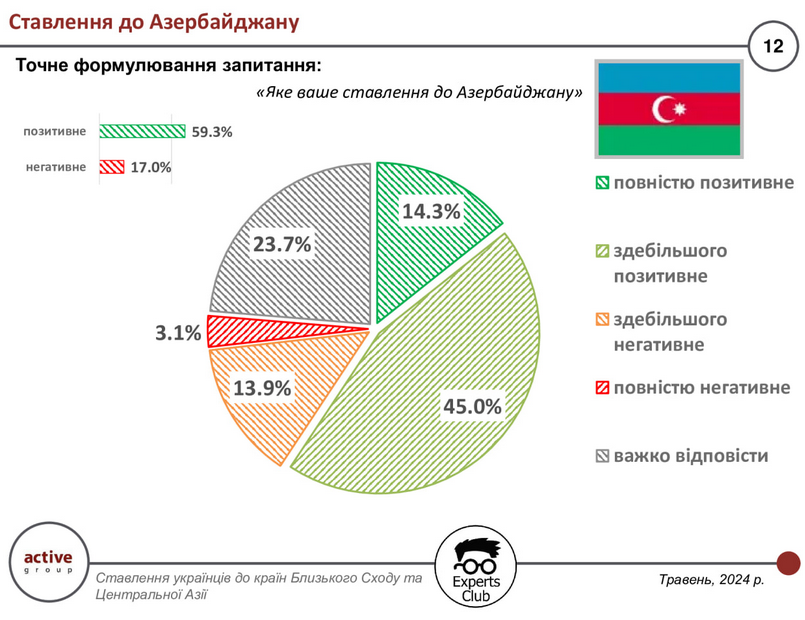
The results of the survey are as follows:
Completely positive – 14.3%.
Mostly positive – 45.0%.
Mostly negative – 13.9 %.
Completely negative – 3.1 %.
Difficult to answer – 23.7%.
Positive – Negative – 42.3
On February 06, 1992, Ukraine and Azerbaijan established diplomatic relations. The Embassy of Azerbaijan in Ukraine was opened on March 12, 1997.
The joint research by Active Group and Experts Club on the attitudes of Ukrainians towards the countries of East Asia and the Middle East was conducted in April-May 2024. It covers such countries as Turkey, Iran, Israel, Egypt, Jordan, Saudi Arabia, UAE, Afghanistan, Pakistan, Azerbaijan, Uzbekistan, Turkmenistan, Kyrgyzstan, Tajikistan, Kazakhstan, Georgia, Armenia, India, China, Republic of Korea, DPRK, Japan, Vietnam, Indonesia, Syria, and Iraq. Full information on the research is available on the website of the Club of Experts at

Active Group and Experts Club have conducted a joint study on the attitudes of Ukrainians towards the countries of East Asia and the Middle East. The study was presented at the Interfax-Ukraine news agency in June 2024. The research was presented by Maksym Urakin and Oleksandr Poznyi. The results of the study are as follows:
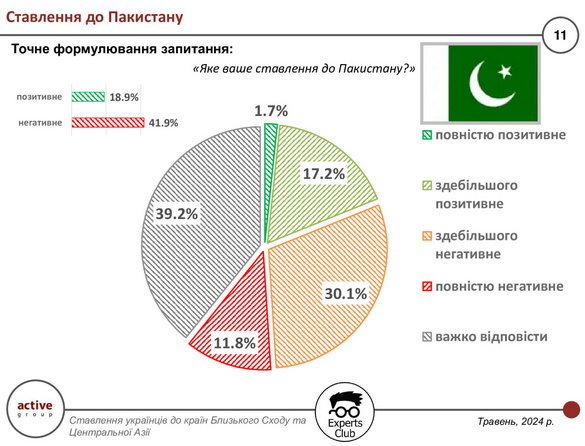
The results of the survey are as follows:
Completely positive – 1.7%.
Mostly positive – 17.2
Mostly negative – 30.1 %.
Completely negative – 11.8 %.
Difficult to answer – 39.2%.
Positive – Negative – 23.0%.
On March 16, 1992, diplomatic relations between Ukraine and Pakistan were established. The Embassy of Pakistan has been operating in Kyiv since October 1997.
The joint research by Active Group and Experts Club on the attitudes of Ukrainians towards the countries of East Asia and the Middle East was conducted in April-May 2024. It covers such countries as Turkey, Iran, Israel, Egypt, Jordan, Saudi Arabia, UAE, Afghanistan, Pakistan, Azerbaijan, Uzbekistan, Turkmenistan, Kyrgyzstan, Tajikistan, Kazakhstan, Georgia, Armenia, India, China, Republic of Korea, DPRK, Japan, Vietnam, Indonesia, Syria, and Iraq. Full information on the research is available on the website of the Club of Experts at
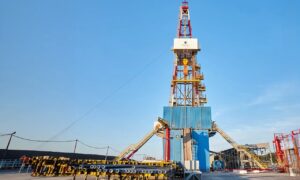
Ukrgasvydobuvannya JSC has drilled and launched a well with a daily flow rate of 439 thousand cubic meters of gas, the press service of Naftogaz Group reported on Friday.
According to the press service, the 5,767-meter-deep well was drilled as an exploration well to clarify the geological structure and assess the gas content of deposits in one of the recently discovered fields.
The well was drilled in September 2023 by Ukrburgaz drilling department.
“Naftogaz continues to increase its own gas production even in times of war. We recognize the importance of increasing production for the country’s energy independence and sustainability, as well as the stability of the upcoming heating season. I am grateful to the team for the result,” said Oleksiy Chernyshov, Group CEO.
According to Oleg Tolmachev, Head of UGV, the results obtained mean that the field will be further exploratory drilled to increase the raw material base and production volumes. “We have completed drilling two more exploration wells at the field. They are currently being prepared for testing,” he added.
As reported, in January-May 2024, Ukrgasvydobuvannya launched 36 new gas wells, 11 of which are highly productive and produce more than 100 thousand cubic meters of gas per day.
In 2023, UGV launched 86 new wells, 24 of which have an initial flow rate of more than 100 thousand cubic meters.
In 2022, UGV produced 12.5 bcm of natural gas (commercial), which is 3% less than in 2021. In 2023, the company produced 13.224 bcm of commercial gas, which is 0.679 bcm more than in 2022.
NJSC Naftogaz of Ukraine owns 100% of Ukrgasvydobuvannya shares.
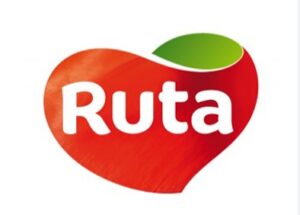
In January-May 2024, Ruta, a major Ukrainian manufacturer of sanitary and hygienic paper products, whose management company is VGP JSC (Lutsk), produced products worth UAH 680.6 million, which is 1.5% more than in the same period in 2023.
According to statistics provided by UkrPapir Association to Interfax-Ukraine, the company has thus returned to positive dynamics in this indicator over the past five months compared to the same period last year, while in January-April it showed a 12% decline.
In terms of volume, the company’s production of toilet paper in rolls remained at last year’s level – 54.7 million units, which remains the third best result in the industry after Kyiv Cardboard and Paper Mill (107.6 million units) and Kokhava Paper Mill (58.2 million units).
The company produces pulp-based sanitary and hygiene products from imported base paper.
VGP’s portfolio includes dry and wet wipes, toilet paper, paper handkerchiefs, and kitchen towels. The assortment includes more than 180 items.
As reported, in 2023, the company produced products worth UAH 1 billion 611 million, which is 64.8% more than in 2022.
According to the Clarity-project, in the first quarter of this year, VGP increased its net profit by 43% to UAH 45.5 million, while revenue increased by 9% to UAH 402 million.

Active Group and Experts Club have conducted a joint study on the attitudes of Ukrainians towards the countries of East Asia and the Middle East. The research was presented at the Interfax-Ukraine news agency in June 2024. The research was presented by Maksym Urakin and Oleksandr Poznyi. The results of the study are as follows:

The results of the survey are as follows:
Completely positive – 2.9%.
Mostly positive – 10.3
Mostly negative – 30.1 %.
Completely negative – 22.5
Difficult to answer – 34.2%.
Positive – Negative – 39.5
On March 17, 1992, Ukraine and Afghanistan established diplomatic relations.
The joint research by Active Group and Experts Club on the attitudes of Ukrainians towards the countries of East Asia and the Middle East was conducted in April-May 2024. It covers such countries as Turkey, Iran, Israel, Egypt, Jordan, Saudi Arabia, UAE, Afghanistan, Pakistan, Azerbaijan, Uzbekistan, Turkmenistan, Kyrgyzstan, Tajikistan, Kazakhstan, Georgia, Armenia, India, China, Republic of Korea, DPRK, Japan, Vietnam, Indonesia, Syria, and Iraq. Full information on the research is available on the website of the Club of Experts at

Active Group and Experts Club have conducted a joint study on the attitudes of Ukrainians towards the countries of East Asia and the Middle East. The research was presented at the Interfax-Ukraine news agency in June 2024. The research was presented by Maksym Urakin and Oleksandr Poznyi. The results of the study are as follows:
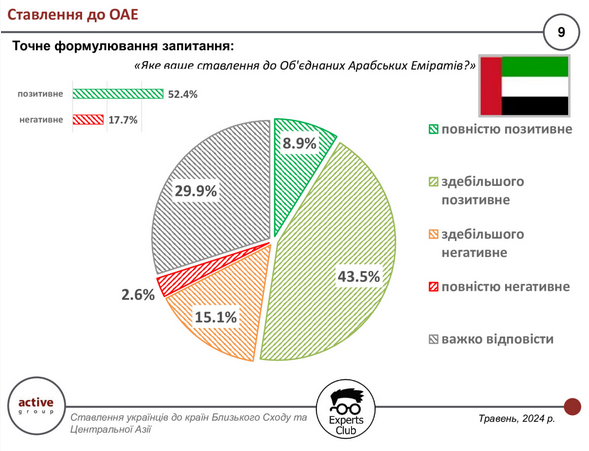
The results of the survey are as follows:
Completely positive – 8.9%.
Mostly positive – 43.5
Mostly negative – 15.1 %.
Completely negative – 2.6
Difficult to answer – 29.9%.
Positive – Negative – 34.7
3 On October 15, 1992, Ukraine and the UAE established diplomatic relations. On March 11, 2013, the Embassy of the United Arab Emirates was opened in Kyiv.
A joint study by Active Group and Experts Club on the attitudes of Ukrainians towards East Asia and the Middle East was conducted in April-May 2024. It covers such countries as Turkey, Iran, Israel, Egypt, Jordan, Saudi Arabia, UAE, Afghanistan, Pakistan, Azerbaijan, Uzbekistan, Turkmenistan, Kyrgyzstan, Tajikistan, Kazakhstan, Georgia, Armenia, India, China, Republic of Korea, DPRK, Japan, Vietnam, Indonesia, Syria, and Iraq. Full information on the research is available on the website of the Club of Experts at